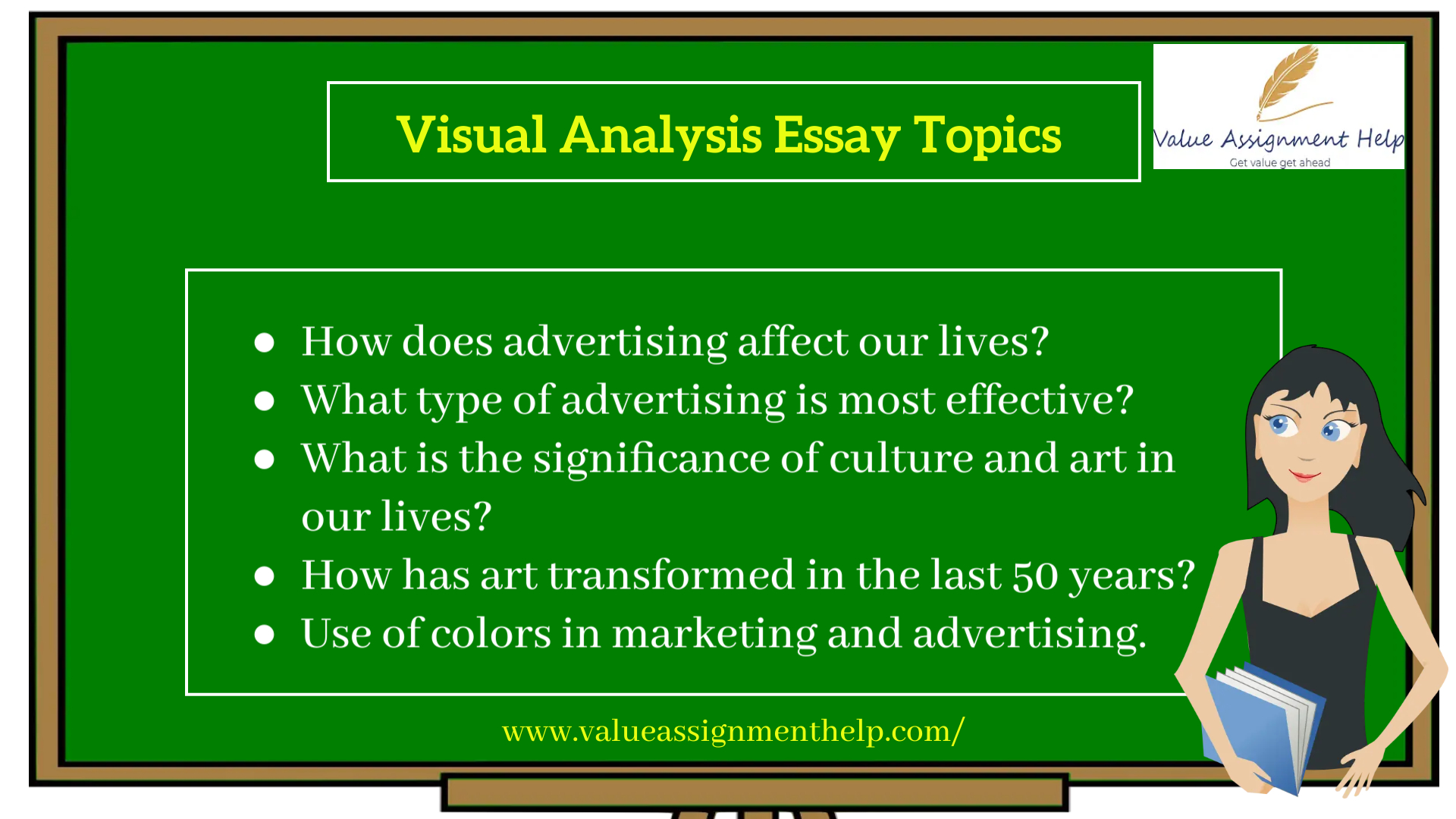
Search Assignments
Table of Contents
Our Experts

Search Assignments

Customers Reviews
Gone are the days when people used to crumble through pages after pages for sourcing the data. The new age concept stresses how you can hook a reader to your article within a shorter interval. The Visual Analysis essay combines the usage of data and presentation. Unlike other essays like descriptive, persuasive, explanatory, and analytical, a visual analysis essay stresses the articulation of the content rather than penning it down in black and white.
Our essay writers have always helped meet students' academic needs worldwide and provided them with immediate answers. Value Assignment Help is a benevolent firm specialising in Essay writing and has assisted with numerous essays, from the idea to the building up of concept-based essays. With the help of our high-quality reference essays, it will not be too difficult to understand our expertise in the field. In the current article, we have discussed the questions that pop up about the visual analysis essay.

A visual analysis essay is analytical writing that asks the reader to examine a work of art—this style of writing analyses various aspects of art through images.
It is a common misconception that an essay of this type only consists of text and pictures.
However, its unique look requires you to present your point with visual images. So, a reader can completely understand what you are trying to explain.
These essays are creative and engaging, allowing you to analyse the visual elements of literature. In addition, it gives you an in-depth knowledge of different aspects of art like paintings and sculptures.
It is essential to use descriptive words if you want your essay to be exciting and engaging.
Students must know how to put together a subject when analysing visual performance. This is what is called composition. When talking about composition while describing visual performance, the author should cover the location of things in the image. Also, this aspect describes how things are related within the canvas. When analysing an image, a student should focus on answering several questions related to the composition. These, in turn, include what is included in the primary figure, how the artist placed the other figures relative to the primary figure, and what they omitted.
Artists use various methods to bring their works to life when creating an image. However, these approaches are the ones that emphasise the elements of the design. Therefore, students should familiarise themselves with these elements by answering specific questions when writing a visual analysis essay. These aspects include understanding the design elements – colour, shape, size, form and line – that most exemplify an image or visual display.
A focal point is a part of an image or visual performance in which an artist captures the audience's attention. In this case, when writing a visual analysis essay, students should address this visual element by understanding its focal point and design elements used by an artist to describe this part of an image, such as line, form, colour, and shape. To give an example.
When creating an image, artists use an element of colour to illustrate a visual aspect of their works. In this case, "monochromatic" means that artists have used one colour to create an image, while "complementary" means using colours opposite each other on a colour wheel. Also, when writing a visual analysis essay, students should describe how an element of colour affects a visual image, focusing on the colours used by artists and how they create an image's tone and mood and affect the meaning.
An element of line emphasises the precise lines presented in an image. Typically, these lines result from the artist's attempt to place individual objects into a single image or visual display. Therefore, when writing a visual analysis essay, students should describe how the lines help draw an audience's attention toward or away from specific parts of an image.
Balance is created in a work of art when it harmoniously combines texture, colour, form or shape. In this image, notice how the photographer achieves a sense of balance by dividing the image into two sections: one half is captured by trees, and the other half is captured by water.
Contrast uses many design elements to capture the viewer's attention and guide the viewer's eyes through the artwork. For example, the trees' texture contrasts with the water's texture in this image.
Movement is how the viewer's eye is directed to move through a composition, often in areas of emphasis. Lines can direct movement, contrasting shapes or colours within the artwork. In this work of art, our eye turns to two paddlers through patterns in the wavy surface of the water. From there, our eye turns to the contrasting textures and colours of the foliage in the top part of the image.
Emphasis is made in a work of art when the artist determines colours, textures, or shapes to direct your viewing towards a specific part of the image. For example, in this image, the paddlers' kayaks' colours contrast with the background's muted tones. As a result, our attention is immediately drawn to paddlers, even if they are relatively small in scale.
The pattern is the repetition of a shape, form or texture in a work of art. For example, light reflected from waves in the water creates a pattern in the lower half of the image.
Not knowing where to start is the primary problem that prevents students from writing quality visual analysis essays. But organising your work in advance and identifying critical steps in the writing process will save you time and effort. Here's our guide to how to write a stunning visual analysis essay:
It only takes 10-15 minutes to create an outline but serves as a means of excellent, problem-free writing. A well-crafted outline enhances the structure, making it seem broad, logical, and solid. Creating an outline will also help you avoid jotting down all the ideas and conclusions. No matter how much time you have devoted to research and observation, you may lose some marks if you fail to organise them on paper.
As a rule, you must write 2-4 sentences for the introductory part. Unlike most argumentative essays, a visual analysis essay doesn't require much background information. The goal is to capture the reader's attention, so you can present a statement that will make the reader feel the painting's tone, mood, and setting without actually seeing it. When you look at the image, what comes to your mind? Think about it.
Getting acquainted with the painting is better before you take a pen and draft body paragraphs. Examine the object in detail, inspect it, and note the seemingly insignificant elements—all colours, spaces, shapes and lines matter. Afterwards, you can write a thesis statement.
Look at your thesis statement once again and give an argument for it. To do this, conduct a thorough analysis and pay attention to the author's design elements. When discussing each component, don't forget to mention why each is relevant and how each justifies the thesis statement.
Finally, you can again refer to the thesis statement and expand on that as a closing remark. In addition, you can choose to present a suggestive statement. Doing so will impress the reader!
Here are some top visual analysis essay topics you can choose and start the writing process.
Writing a visual analysis essay is an essential pedagogical exercise for students. Since the purpose of such an essay is to analyse an image or visual display, learners should familiarise themselves with design elements, such as colour, shape and texture, and design principles, such as emphasis and contrast. In short, students use these concepts to provide an in-depth description of an image. Therefore, while writing a visual analysis essay, scholars should learn the following tips:




No Comments